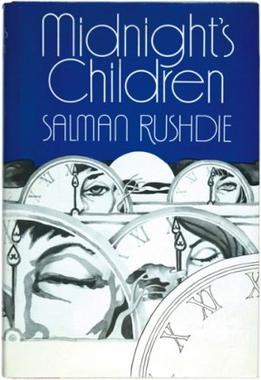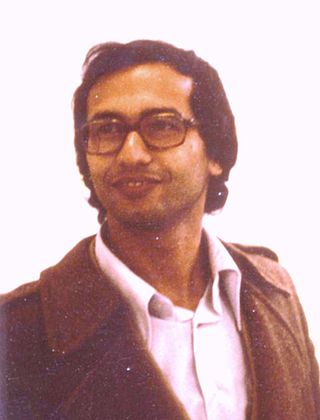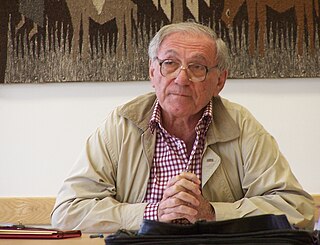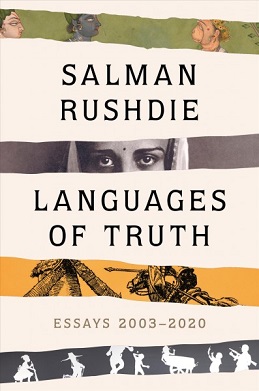
William Robertson Davies was a Canadian novelist, playwright, critic, journalist, and professor. He was one of Canada's best known and most popular authors and one of its most distinguished "men of letters", a term Davies gladly accepted for himself. Davies was the founding Master of Massey College, a graduate residential college associated with the University of Toronto.

Sir Ahmed Salman Rushdie is an Indian-born British-American novelist. His work often combines magic realism with historical fiction and primarily deals with connections, disruptions, and migrations between Eastern and Western civilizations, typically set on the Indian subcontinent. Rushdie's second novel, Midnight's Children (1981), won the Booker Prize in 1981 and was deemed to be "the best novel of all winners" on two occasions, marking the 25th and the 40th anniversary of the prize.

Midnight's Children is a 1981 novel by Indian-British writer Salman Rushdie, published by Jonathan Cape with cover design by Bill Botten, about India's transition from British colonial rule to independence and partition. It is a postcolonial, postmodern and magical realist story told by its chief protagonist, Saleem Sinai, set in the context of historical events. The style of preserving history with fictional accounts is self-reflexive.

The Satanic Verses is the fourth novel of the Indian-British writer Salman Rushdie. First published in September 1988, the book was inspired by the life of the Islamic prophet Muhammad. As with his previous books, Rushdie used magical realism and relied on contemporary events and people to create his characters. The title refers to the Satanic Verses, a group of Quranic verses about three pagan Meccan goddesses: Allāt, Al-Uzza, and Manāt. The part of the story that deals with the satanic verses was based on accounts from the historians al-Waqidi and al-Tabari.
Hobson-Jobson: A Glossary of Colloquial Anglo-Indian Words and Phrases, and of Kindred Terms, Etymological, Historical, Geographical and Discursive is a historical dictionary of Anglo-Indian words and terms from Indian languages which came into use during the British rule in India.
Hysterical realism is a term coined in 2000 by English critic James Wood to describe what he sees as a literary genre typified by a strong contrast between elaborately absurd prose, plotting, or characterization, on the one hand, and careful, detailed investigations of real, specific social phenomena on the other. It is also known as recherché postmodernism.
Leonard Williams Levy was an American historian, the Andrew W. Mellon All-Claremont Professor of Humanities and chairman of the Graduate Faculty of History at Claremont Graduate School, California, who specialized in the history of basic American Constitutional freedoms.

Tahar Djaout was an Algerian journalist, poet, and fiction writer. He was assassinated in 1993 by the Armed Islamic Group.

Why I Am Not a Muslim, a book written by Ibn Warraq, is a critique of Islam and the Qur'an. It was first published by Prometheus Books in the United States in 1995. The title of the book is a homage to Bertrand Russell's essay, Why I Am Not a Christian, in which Russell criticizes the religion in which he was raised.

Shalimar the Clown is a 2005 novel by Salman Rushdie. The novel took Rushdie four years to write, and was initially published on 6 September 2005 by Jonathan Cape. Shalimar the Clown derives its name from Shalimar Gardens, in the vicinity of Srinagar. Srinagar is one of several Mughal Gardens, which were laid out in several parts of undivided India when the Mughals reigned over the subcontinent. Shalimar is also the name of one of the characters featured in the novel. Shalimar the Clown won the 2005 Vodafone Crossword Book Award and was one of the finalists for the 2005 Whitbread Book Awards.
Pauline Melville FRSL is an English-Guyanese writer and former actress of mixed European and Amerindian ancestry, who is currently based in London, England. Among awards she has received for her writing – which encompasses short stories, novels and essays – are the Commonwealth Writers' Prize, the Guardian Fiction Prize, the Whitbread First Novel Award, and the Guyana Prize for Literature. Salman Rushdie has said of Melville: "I believe her to be one of the few genuinely original writers to emerge in recent years."

Sadiq Jalal Al-Azm was a Professor Emeritus of Modern European Philosophy at the University of Damascus in Syria and was, until 2007, a visiting professor in the Department of Near Eastern Studies at Princeton University. His main area of specialization was the work of German philosopher Immanuel Kant, but he later placed a greater emphasis upon the Islamic world and its relationship to the West, evidenced by his contribution to the discourse of Orientalism. Al-Azm was also known as a human rights advocate and a champion of intellectual freedom and free speech.

The Satanic Verses controversy, also known as the Rushdie Affair, was a controversy sparked by the 1988 publication of Salman Rushdie's novel The Satanic Verses. It centered on the novel's references to the Satanic Verses, and came to include a larger debate about censorship and religious violence. It included numerous killings, attempted killings, and bombings by perpetrators who supported Islam.
Thomas Michael Maschler was a British publisher and writer. From 1960, he was influential as the head of publishing company Jonathan Cape over a period of more than three decades. Maschler was noted for instituting the Booker Prize for British, Irish and Commonwealth literature in 1969. He was involved in publishing the works of many notable authors, including Ernest Hemingway, Joseph Heller, Gabriel García Márquez, John Lennon, Ian McEwan, Bruce Chatwin and Salman Rushdie.
Saleem Sinai is the protagonist of the Booker Prize-winning novel Midnight's Children by Salman Rushdie. His life is closely intertwined with the events that take place in his homeland of pre- and post-colonial India, and newly created Pakistan and Bangladesh. He is born at the moment in time when India and Pakistan emerge from British rule and lives during the new tumultuous struggles that engulf the new nations following 15 August 1947. Sinai embodies these physical struggles and rifts during, and serves as a metaphor for, the spiritual, religious, political and intellectual traumas of the young nations.
Symbolic boundaries are a theory of how people form social groups proposed by cultural sociologists. Symbolic boundaries are “conceptual distinctions made by social actors…that separate people into groups and generate feelings of similarity and group membership.”
A social space is physical or virtual space such as a social center, online social media, or other gathering place where people gather and interact. Some social spaces such as town squares or parks are public places; others such as pubs, websites, or shopping malls are privately owned and regulated. Émile Durkheim coined the term social space; among other writers, sociologist Henri Lefebvre developed the concept from the 1960s.

Joseph Anton: A Memoir is an autobiographical book by the British Indian writer Salman Rushdie, first published in September 2012 by Random House. Rushdie recounts his time in hiding from ongoing threats to his life.

Quichotte is a 2019 novel by Salman Rushdie. It is his fourteenth novel, published on 29 August 2019 by Jonathan Cape in the United Kingdom and Penguin Books India in India. It was published in the United States on 3 September 2019 by Random House. Inspired by Miguel de Cervantes's classic novel Don Quixote, Quichotte is a metafiction that tells the story of an addled Indian-American man who travels across America in pursuit of a celebrity television host with whom he has become obsessed.

Languages of Truth is a collection of essays by Salman Rushdie. It was published in May 2021 by Random House.












